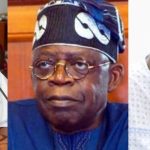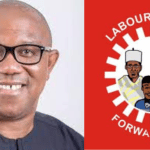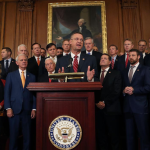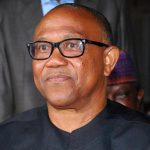OFFICIAL TRIBUTE TO CHIEF (DR.) WELLINGTON OKIRIKA, CON “Mr. 13%” — A Titan of the Niger Delta and Architect of Economic Justice
Delivered at the Public Launch of His Biography
By High Chief Jackrich Sobomabo
Today’s event is not just the unveiling of a biography; it is the celebration of a legacy that has helped shape the course of the Niger Delta’s history. Chief (Dr.) Wellington Boboayefa Okrika, known widely and fondly as “Mr. 13%,” lived a life of purpose and dedication to his people. His story is one that will echo through generations, not only in the pages of this book but in the lives of those he touched and the institutions he built.
Born on June 26, 1946, in Kunukunuma, Gbaramatu Kingdom in Warri South-West Local Government Area of Delta State, Chief Okrika was a son of the soil who rose to become a national voice for justice and fairness. He earned a degree in Forestry from the University of Ibadan and served the then Bendel State and later Delta State in various professional and administrative capacities. But his greatest contribution to Nigeria, and particularly to the Niger Delta, lay beyond the civil service.
Chief Okrika is best remembered for his leading role in advocating for the implementation of the 13% derivation principle as provided in the 1999 Constitution. He stood at the forefront of the struggle to ensure that oil-producing communities received a fair share of the wealth extracted from their land. This earned him the title “Mr. 13%,” not as a nickname, but as a symbol of what can be achieved through vision, courage, and perseverance.
Between 2000 and 2004, I was privileged to enjoy a close relationship with Chief Okrika. This was during a turbulent period, marked by heightened ethnic tensions and conflict in Delta State. Amidst the uncertainty and division, Chief Okrika provided guidance and wisdom that helped shape many of us who were then young, emerging leaders. His mentorship was not just about politics or policy—it was about values, responsibility, and the need to always remember who we were fighting for. He made me understand the importance of the 13% derivation fund, not just as a revenue stream, but as a tool for justice and development. He made us understand how these funds, if properly managed and defended, could bring real change to our communities—schools, hospitals, roads, jobs, and hope. He spoke to us not as a distant elder, but as a father who believed in our capacity to carry the torch.
Chief Okrika’s leadership went beyond advocacy. He founded the Host Communities of Nigeria Producing Oil and Gas (HOSTCOM), an organization that gave structure and voice to the people of the Niger Delta. He also helped establish TROMPCON/OMPCON, bringing together various ethnic nationalities to speak with one voice. Through these platforms, he pushed for accountability from both government and oil companies, always with the goal of securing tangible benefits for host communities.
As Executive Chairman of the Delta State Oil Producing Areas Development Commission (DESOPADEC) from 2007, Chief Okrika translated advocacy into action. Under his stewardship, the commission invested in infrastructure, scholarships, healthcare, and empowerment programs across the oil-producing areas of the state. He believed in development that reached the grassroots, and his work with DESOPADEC proved what was possible when leadership is rooted in sincerity and service.
Chief Okrika was a man of many honors. He was conferred with the national honour of Commander of the Order of the Niger (CON), and he held respected traditional titles across several kingdoms—Bolowei of Gbaramatu, Peregbalowei of Kabowei, Erhire of Okpe, and many others. These titles were a reflection of the deep trust and love he earned across diverse communities.
Yet, beyond the titles and accolades, Chief Wellington Okrika will be remembered for his character—humble, wise, firm, and deeply committed to the upliftment of his people. His life’s work brought dignity to oil-producing communities and paved the way for a generation of leaders to build on his foundation.
The launch of his biography is a call to all of us—not just to remember, but to continue. To continue the fight for fairness. To defend the legacy of resource justice. To ensure that the principles he stood for do not fade with time.
Chief Wellington Okrika did not fight for fame. He fought for his people. He didn’t leave behind wealth; he left behind impact. His name will live on in every young leader he inspired, in every community transformed by the derivation fund, and in every future dreamer who dares to speak up for what is right.
Delivered at the Public Launch of His Biography
By High Chief Jackrich Sobomabo
Today’s event is not just the unveiling of a biography; it is the celebration of a legacy that has helped shape the course of the Niger Delta’s history. Chief (Dr.) Wellington Boboayefa Okrika, known widely and fondly as “Mr. 13%,” lived a life of purpose and dedication to his people. His story is one that will echo through generations, not only in the pages of this book but in the lives of those he touched and the institutions he built.
Born on June 26, 1946, in Kunukunuma, Gbaramatu Kingdom in Warri South-West Local Government Area of Delta State, Chief Okrika was a son of the soil who rose to become a national voice for justice and fairness. He earned a degree in Forestry from the University of Ibadan and served the then Bendel State and later Delta State in various professional and administrative capacities. But his greatest contribution to Nigeria, and particularly to the Niger Delta, lay beyond the civil service.
Chief Okrika is best remembered for his leading role in advocating for the implementation of the 13% derivation principle as provided in the 1999 Constitution. He stood at the forefront of the struggle to ensure that oil-producing communities received a fair share of the wealth extracted from their land. This earned him the title “Mr. 13%,” not as a nickname, but as a symbol of what can be achieved through vision, courage, and perseverance.
Between 2000 and 2004, I was privileged to enjoy a close relationship with Chief Okrika. This was during a turbulent period, marked by heightened ethnic tensions and conflict in Delta State. Amidst the uncertainty and division, Chief Okrika provided guidance and wisdom that helped shape many of us who were then young, emerging leaders. His mentorship was not just about politics or policy—it was about values, responsibility, and the need to always remember who we were fighting for. He made me understand the importance of the 13% derivation fund, not just as a revenue stream, but as a tool for justice and development. He made us understand how these funds, if properly managed and defended, could bring real change to our communities—schools, hospitals, roads, jobs, and hope. He spoke to us not as a distant elder, but as a father who believed in our capacity to carry the torch.
Chief Okrika’s leadership went beyond advocacy. He founded the Host Communities of Nigeria Producing Oil and Gas (HOSTCOM), an organization that gave structure and voice to the people of the Niger Delta. He also helped establish TROMPCON/OMPCON, bringing together various ethnic nationalities to speak with one voice. Through these platforms, he pushed for accountability from both government and oil companies, always with the goal of securing tangible benefits for host communities.
As Executive Chairman of the Delta State Oil Producing Areas Development Commission (DESOPADEC) from 2007, Chief Okrika translated advocacy into action. Under his stewardship, the commission invested in infrastructure, scholarships, healthcare, and empowerment programs across the oil-producing areas of the state. He believed in development that reached the grassroots, and his work with DESOPADEC proved what was possible when leadership is rooted in sincerity and service.
Chief Okrika was a man of many honors. He was conferred with the national honour of Commander of the Order of the Niger (CON), and he held respected traditional titles across several kingdoms—Bolowei of Gbaramatu, Peregbalowei of Kabowei, Erhire of Okpe, and many others. These titles were a reflection of the deep trust and love he earned across diverse communities.
Yet, beyond the titles and accolades, Chief Wellington Okrika will be remembered for his character—humble, wise, firm, and deeply committed to the upliftment of his people. His life’s work brought dignity to oil-producing communities and paved the way for a generation of leaders to build on his foundation.
The launch of his biography is a call to all of us—not just to remember, but to continue. To continue the fight for fairness. To defend the legacy of resource justice. To ensure that the principles he stood for do not fade with time.
Chief Wellington Okrika did not fight for fame. He fought for his people. He didn’t leave behind wealth; he left behind impact. His name will live on in every young leader he inspired, in every community transformed by the derivation fund, and in every future dreamer who dares to speak up for what is right.







